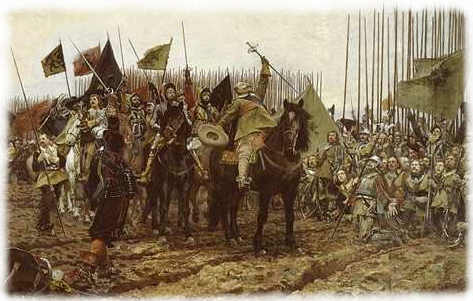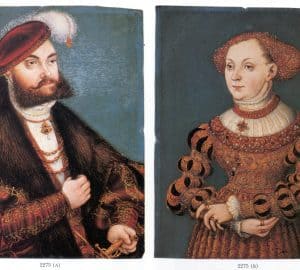Although Gustavus Adolphus won a great victory at Breitenfeld, the war was far from over. The Swedish king continued to attack his enemy’s lands. He restored the Protestants to power, making no difference between the Calvinists and Lutherans as others did. Gustavus did not allow his troops to plunder anyone but the Jesuits, but he did require contributions be given to pay his troops. He would not allow rulers to declare themselves neutral in the war. As he said:
Up for the Gospel those of you who believe in it, or it will be the worse for you! I shall treat neutrality as equivalent to a declaration of war against me.
The victory at Breitenfeld brought more Allies to Sweden, but Gustavus wanted an even stronger alliance. In his diplomacy with the other Protestant rulers he worked to convince them to form another coalition in Germany with Sweden at the head. The German princes were not sure that they wanted this. They did not want to exchange a German emperor for a Swedish one.

At this time both sides also wished for peace and some negotiations proceeded. The terms Gustavus demanded in January, 1632 were that the Edict of Restitution be repealed and the land taken restored, all Protestants be given toleration, and the Jesuits be excluded from the empire, in addition to many territorial matters. Although the emperor may have been amenable to reasonable terms, he did not consider these to be reasonable, so the war continued.
Through the first months of 1632 the maneuvering continued. Adolphus had around 100,000 men, but they were in eight different armies and he had to deal with threats from various angles. Finally 40,000 Swedes began moving into the lands of the Catholic Maximilian of Bavaria. The Catholics had two armies, one under Tilly and the other under Wallenstein. Gustavus determined to strike before these armies could unite. Tilly had 25,000 men positioned along the Lech River. Gustavus began crossing on the morning of April 15. He had developed a plan to crush the Imperial forces by focusing their attacks on a position held by the Swedish infantry, and then hitting them in the rear with the cavalry. This plan never went into effect, for before the cavalry charged, Tilly was badly wounded and Maximilian, who was not a general, ordered the leaderless army to retreat and saved them from complete destruction. The Swedes lost 2,000, the Bavarians 3,000. Gustavus sent his doctor to see Tilly on his request, but his efforts were useless. The famous general died of his wounds 14 days later.

After this new victory the Swedes furthered their advance, and captured Munich. But then they received bad news from the north – that John William of Saxony was negotiating with Wallenstein, who was attacking him. If he switched to the side of the emperor, Gustavus’ retreat would be cut off.
The situation worsened as Gustavus moved north. His allies were faltering. Imperial troops were recapturing the lands the Protestants had won. The king called for reinforcements from across Europe, and began fortifying the city of Nuremberg, one of his allies. Wallenstein arrived with a larger army, and laid siege to the town. For weeks the armies faced each other over the works. The country around was soon stripped of food, and hunger and disease increased in both camps. Gustavus did his best to keep his army from plundering. “My son,” he told one soldier brought before him for stealing a cow, “it is better that I should now punish thee, than that the wrath of God for thy misdeeds and his Judgment should fall on me and thee and all of us here present.” He said in one famous speech to the army:
It is rumoured that the Swedes are as bad as the Imperialists, but I know better. There are no Swedes that commit these crimes but you Germans yourselves. Had I known that you had been a people so wanting in natural affection for your own country, I would never have saddled a horse for your sakes, much less imperiled my life and my crown and my brave Swedes and Finns. I came but to restore every man to his own, but this most accursed and devilish robbing of yours doth much abate my purpose. I have not enriched myself so much as by one pair of boots, since my coming to Germany, though I have had forty tons of gold passing through my hands. By such means as you are now employing, victory will ever be won.

At length Gustavus’ army was reinforced, but this only made the problem of food even worse. Finally the king decided to attack the besiegers’ works. The Battle of Alte Veste raged for hours, but the Protestants were unable to win the strong works. With no further recourse, Gustavus abandoned the town on September 8, unhindered by the Catholics.
Sources
The Thirty Years War by C. V. Wedgwood
Gustavus Adolphus and the Struggle of Protestantism for Existence by C. R. L. Fletcher




